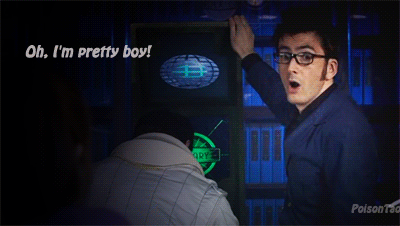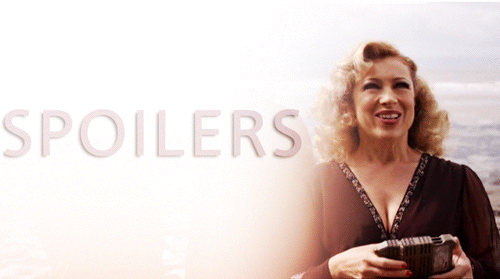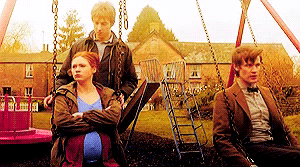Warning:
(Oh, all the River_Song_Spoilers.gifs I could use!)
This is one of those movies where, throughout the entire two hours or so, I have one word in my mind, just throwing itself at the character on the screen: “Bastard.” Potty mouth, yes, but David Tennant’s character really deserves it.
Handsome, charming, creepy and nothing short of lunatic, Brendan Block (David Tennant) is a stranger whom Miranda Cotton (Kate Ashfield) meets, kisses and tumbles into bed with. Ten days later, he turns out to be a creepy stalker. She chucks him out, and five weeks later, he and her love-struck sister, Cary, are engaged. To sum it up quickly, he plays with her depressed brother’s head, causing him to commit suicide, marries Miranda’s best friend on the morning of his wedding to Miranda’s sister, kills his new wife (the police wouldn’t believe Miranda when she insists it wasn’t an accident), gets her money and moves in with another girl, Naomi. Miranda warns Naomi about him, and when Naomi leaves him, Brendan storms into Miranda’s flat, rapes her and kills her. Or so we thought. In the end, we find Miranda in Australia, having planned and fabricated the crime scene with Naomi.
Plot-wise, it’s brilliant (thanks to Nicci French, author of the book the film was based on), although there were a few moments of stupidity on Miranda’s part (lock the door when you’re in the bath! Change the lock on your door! Move out! It’s a trap, you doozehead!). The twist is good, the tone well-sustained. Especially enjoyable is the psychological manipulation Brendan pulls off on everyone around him, with the exception of Miranda.
What I love about TV movies, and British films in particular, is that the acting is always impeccable. The cast are all fine actors, and Robert Lowe, who plays Miranda’s teenage brother, Troy, is to be praised for his portrayal of both a happy, loving brother and a tortured, confused kid.
Kate Ashfield is a very tense Miranda, and filled the whole movie, particularly the first part, with so much angst that I was on edge in my seat the entire time. Her eyes speaks fathoms, and she really reels you in, setting you against Brendan even though sometimes you wonder if you’re mistaken about him and he really is just the charming man he seems to be.
One of the few things I wasn’t quite satisfied with, though, is that the angst might just be drawn out a little too much. I was squirming for the first part, because Miranda looked so worried all the time. Still, there’s cause for that. And she could be a little thick at times. Still, he did take the lives of two of her loved ones, so one can hardly blame her for that. (This is what you get when you meet, kiss and tumble into bed with someone, Miranda!) Still, Kate Ashfield does it well, and she’s deliciously three-dimensional when injecting her martyred anxiety into her pig-headed, tenacious character.
David Tennant, however, is the one I’m actually watching the film for, Whovian that I am. This was before he was introduced as our Doctor, and for all those Tennant-fanatics who adore the Tenth Doctor, I wouldn’t recommend this film. It’ll shatter your idolization of Tennant as the perfect man. But if you’re one of those more open-minded ones, I’d tell you that he’s definitely worth watching this film for. After all, actors have a fear of being typecast.
And it’s safe to say that I wasn’t disappointed by his performance. That comes as no surprise, as we’ve already seen his talent in Doctor Who. Winning, creepy, indignant and completely terrifying—he does it all, and pulls it off with such finesse that River Song must be informed that he is not simply a pretty boy.
Basically, my hand was just itching to slap Brendan Block the whole time, although in the beginning I was just dying to shout at David Tennant being the bad guy. I mean, he’s the Doctor! Nevertheless, he can cast away all worries about being typecast. The man’s a splendid actor, and his portrayal of the no-he-can’t-be-a-stalker-he’s-such-a-perfect-guy-not-to-mention-sexy stalker will haunt you.
I’m sorry if I’ve sidelined most other things and actors in this review, but I’m here because of David Tennant, after all. And for my previous review of Womb—well, I was there for Matt Smith. I tried to watch Jude for Christopher Eccleston, but I couldn’t sit through that one; the choppy scenes were unbearable for me. I’m also going to watch Billie Piper in The Secret Diary of a Call Girl soon. Oh, Doctor Who, the things that you do to me.
Now I’m off to purge my mind of creepy David Tennant with perfect David Tennant, with a side dish of TenRose feels.




